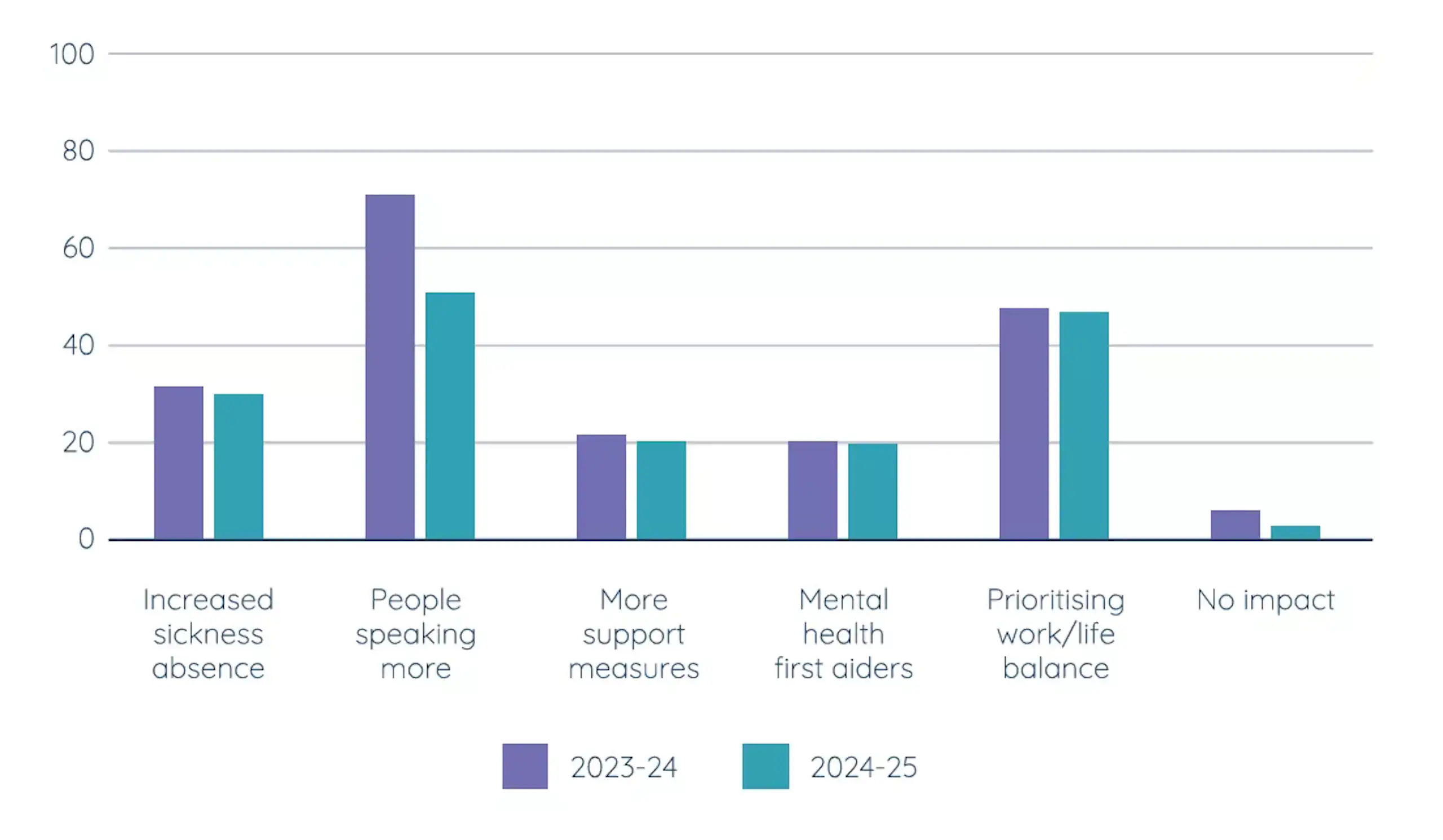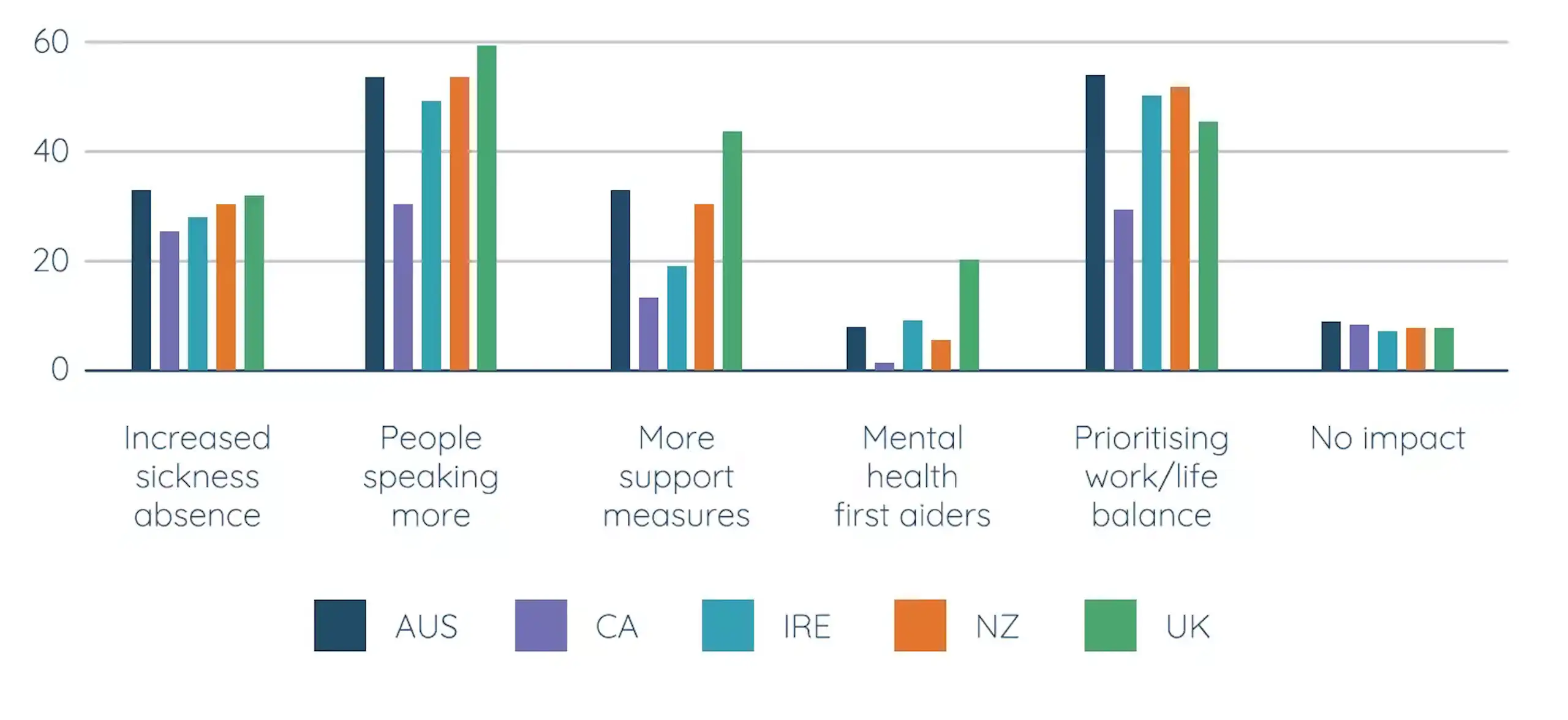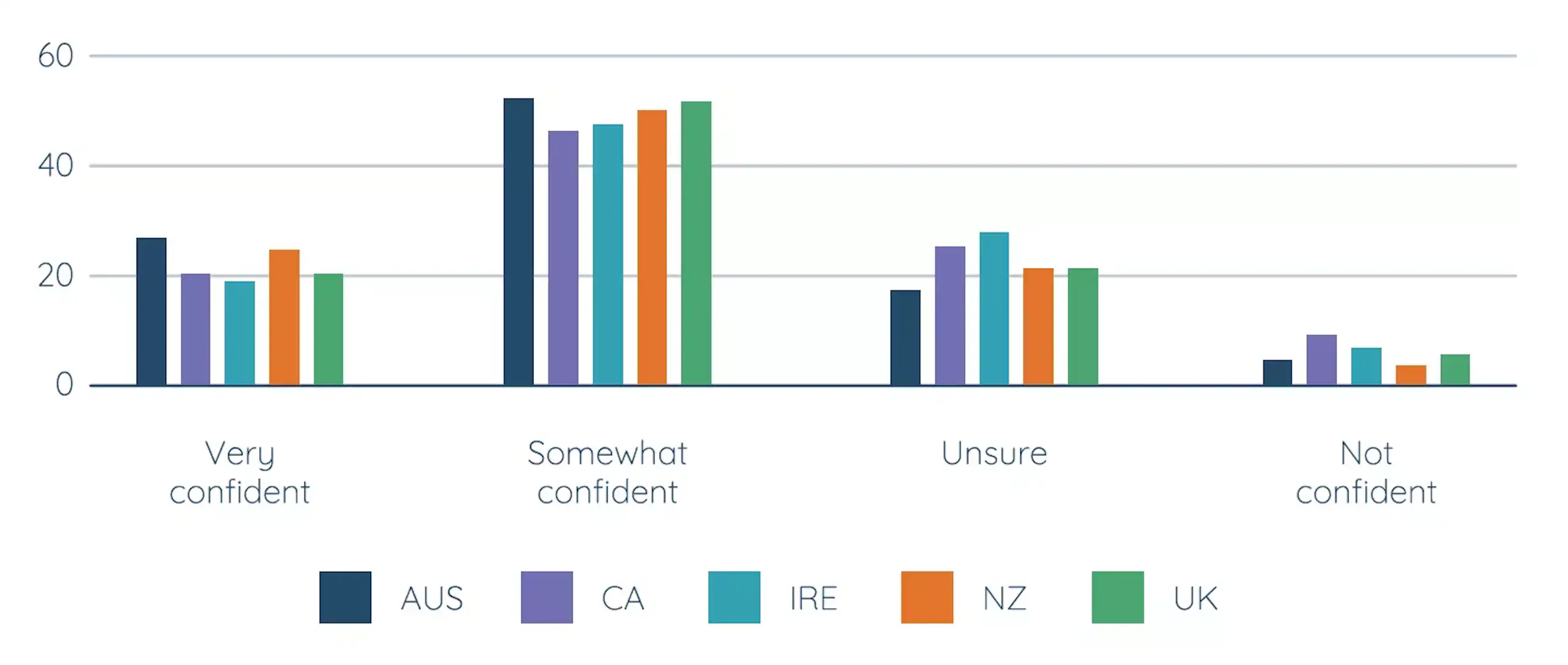Industry
The Impact of Mental Health in the Workplace

Every year, The Peninsula Group conducts a global survey to analyse attitudes towards mental health in the workplace. This year, we surveyed 79,000 businesses across Australia, Canada, Ireland, New Zealand, and the UK to better understand how these trends are changing over time, as well as how they affect performance in the workplace.
Results at a glance
Australia
81% do not offer mental health days in addition to personal leave entitlements
76% are not confident their employees would disclose a mental health issue to their employer
48% of employers surveyed personally experienced poor mental health over the last 12 months
44% have seen an increase in the number of people experiencing issues with mental health at work over the last 12 months
33% have seen an increase in sickness absence due to mental health
33% have put more support measures in place to support employee mental health
New Zealand
83% do not offer mental health days in addition to personal leave entitlements
77% are not confident their employees would disclose a mental health issue to their employer or line manager
57% do not plan to implement any plans to improve mental health at work in the next 12 months
53% saw an increase in the number of employees experiencing issues with mental health over the last 12 months
28% have put more support measures in place for their employees
25% have an Employee Assistance Program (EAP)
21% have seen an increase in sickness due to mental health
Download the full whitepaper
Sickness-related absences – compared
Australia
33% agree that they’ve seen an increase in sickness absence due to mental health issues. However, of these, 61% are not confident their employees would disclose mental health issues to their employer or line manager, which leads us to believe that the true number of mental health related absence could be higher.
One respondent gave an interesting response highlighting their support for mental health days, and the unique challenges in their industry.
Survey respondent: “We have had team members that have taken days off for mental health in the past and have always supported them, but being a small business in a retail and service industry, we cannot provide work from home as all work is either in the retail store or in a pool servicing van. We understand that more and more people are having mental health issues, and we will always support them, but we are limited in what we can do in the workplace”.
The same respondent has nothing in place, nor any plans to introduce any mental health provisions in their workplace in the next 12 months.
New Zealand
The story is similar, although slightly more optimistic, in New Zealand. 21% of respondents have seen an increase in sickness in work due to mental health issues. But what’s alarming is that 70% of survey respondents have no plans to implement any new measures to improve mental health in their workplace in the next 12 months.
One respondent said: “Grief has hit our employees hard, which impacts mental health, work, and personal wellbeing. They have attended grief counselling.”
And whilst it’s great to see a reactive approach to grief in the workplace, this same organisation reported no proactive mental health and psychosocial wellbeing initiatives.
Poor attitudes towards mental health from leaders
Despite positive year-on-year data showing improved mental health at work, some employers express strong feelings towards mental health issues.
By passing judgement without trying to understand the individual’s mental health concerns, employers may be perpetuating mental health stigma at work.
Survey respondent (Australia): “Enshrining mental health into workplace laws shows how pathetic we are as a society. Suicide is at record levels and yet so too is our "awareness" of mental health. Stoicism, intestinal fortitude and having a personal moral code are far more respectable qualities. Obsessing over mental health creates insecurity, fearfulness and is also emasculating. Australians who went to war would be ashamed of how flaccid we have become. Regarding mental health...too much naval gazing and "woe is me" will be our demise. If you look into the abyss long enough, you'll fall in”.
Survey respondent (New Zealand):
“I'm increasingly frustrated with how mental health is constantly pushed into every corner of life. It feels like we're encouraging people to focus on their problems instead of building resilience. Humans have always faced hardship — war, tragedy, setbacks — and we've endured by working hard, staying focused, and contributing to something beyond ourselves.”
Whilst the entire onus isn’t on the employer to rectify mental health concerns, it’s important for organisations to see how workloads, duties, workplace culture, expectations and goals (if any) factor into someone’s psychosocial wellbeing.
Sadly, we little in the way of offering support for employees in the next 12 months. This suggests that some employers may not be aware of their legal duty of care stipulated in The Work Health and Safety Act 2011 – which imposes a duty on employers to eliminate or minimise risks to mental health arising from the workplace as reasonably as they can.
More survey responses can be found in our full whitepaper.
Lack of education about mental health in leaders
In the same breath, some employers show a lack of understanding about the benefits that mental health initiatives can bring for employees.
Survey respondent (Australia): “I do not intend to offer additional leave for 'mental health days' - that would increase the strain on the remaining employees as well as increase costs we can't recover. I see my role as an employer is to create positions with manageable workloads, communicate and receive needs and expectations between our employees and ourselves clearly, and create and maintain a positive workplace culture. I do not see it as part of my or my management team's role to become involved as part of an employees' support system unless the issue is work related. There are too many risks. We could expose ourselves and our managers to issues that we have no reason, no skills, no training and no desire to become involved with. Forcing managers to receive information about a direct reports mental health issues will create challenges with performance management. It could cause situations where information brings up past trauma for the manager, creating a new mental health issue - who will be held responsible for that?”.
Survey respondent (New Zealand):
“I'm increasingly frustrated with how mental health is constantly pushed into every corner of life. It feels like we're encouraging people to focus on their problems instead of building resilience. Humans have always faced hardship — war, tragedy, setbacks — and we've endured by working hard, staying focused, and contributing to something beyond ourselves”.
Support for employers
A common theme among respondents is that while they acknowledge the importance of a health and wellbeing provision and want to support their employees, more support also needs to be in place for businesses.
Survey respondent (AUS) “Supporting staff wellbeing must not come at the cost of the owner's own. The system cannot keep demanding more from those already stretched to the limit. If the government expects small businesses to carry the weight of a broken mental health system, it must also carry its share — with funding, infrastructure, and respect.”
Survey respondent (NZ) “I am not quite sure how to be diplomatic about this conundrum as I feel I am not allowed to speak out about this issue without coming across as unfeeling. It is extremely frustrating.”
Notable year-on-year comparisons
Although the perception of increased sickness rates appears to have decreased, so have other areas, such as speaking more openly, having more support measures in place at work, and prioritising work-life balance.
Australia
What impact have you seen on mental health in your workspace over the last 12 months?

New Zealand

Year on year, Australian employers have remained comfortable discussing mental health at work – including being more open about discussing their own mental health. More employers are willing to push themselves out of their comfort zones to ensure employees know they have support. New Zealand, however, is showing a decline across the board.
Australia
Do you feel comfortable discussing mental health concerns in the workplace?

New Zealand
Do you feel comfortable discussing mental health concerns in the workplace?

Global results
To get a well-rounded view of attitudes globally, we surveyed the countries we trade in to get an idea of how mental health is impacting the workplace. The impact varies per territory, with the UK and Australia seeing the highest rates of absences due to mental health.
• 1 in 3 employers globally saw increased sickness absence due to mental health over the last 12 months
• Canada and Ireland have seen the lowest increased rates of absences related to mental health
• The UK leads the way when it comes to mental health support in the workplace
• 1 in 3 employers globally saw increased sickness absence due to mental health over the last 12 months
• Australia tops the charts with work-life balance, but also in increased absences
• Employers in New Zealand are most likely, and UK and Irish employers are least likely, to take time off due to mental ill health
What impact have you seen on mental health in your workplace over the last 12 months?

How confident are you that your employees would disclose a mental health issue to you or their line manager

Have you seen an increase in the number of peope experiencing issues with mental health in your workplace

Recommendations
Based on our findings, we’ve highlighted our top three recommendations that employers should consider:
1. Embed mental health and wellbeing throughout your workplace
Ensure you have proper provision in place to support mental health and wellbeing in your workplace. This needs to be embedded across all levels of your organisation, not just put in place and forgotten about. Review it regularly, look at usage levels and get feedback from employees to find out what is of value to them. Create a workplace that normalises conversations about mental health, and lead by example. Look for ways to proactively support staff; this, in turn will help reduce absence rates and increase productivity.
Poor mental health is costing employers approximately $11.5 billion a year in Australia, and $1.3 billion in New Zealand.
The average return on investment for every $1 spent on an EAP is $601.34, so looking after your people and their mental health makes business sense for boosting peak performance.
With greater access to wellbeing support, individual recovery rates can improve and the impact of long-term health and mental health conditions on the workplace can be lessened.
2. Do more than signpost support Signposting isn’t enough. We recommend encouraging real interactions to facilitate open conversations and to really get to the crux of what may be going on with an individual who has experienced increased sickness rates due to poor mental health. This can look like implementing new wellbeing initiatives or something as simple as starting an open discussion about a mental health awareness campaign or concern.
3. Empower your people It’s not about solving an individual's problems. It’s about empowering them to do so. Ultimately, it’s down to the individual to seek support, but they may not have the systems or skills in place to do so. It could be that the workplace or the work they’re doing is making them feel worse. What small changes can you implement to make a difference in their lives for the betterment of workplace engagement, peak performance and psychological safety at work?
How an Employee Assistance Programme with Wisdom Wellbeing can help
As an award-winning EAP provider, we aim high, and we achieve it. Our goal is 100% engagement, and we want everyone in your care to use our service and can be your very own trusted wellbeing partner. Public, private and non-profit organisations globally have relied on our clinical expertise year after year to keep their people on-track.
Download the full whitepaper

HA | Wisdom Wellbeing
HA | Wisdom Wellbeing is the UK and Ireland’s leading EAP provider. Specialising in topics such as mental health and wellbeing, they produce insightful articles on how employees can look after their mental health, as well as how employers and business owners can support their people and organisation. They also provide articles directly from their counsellors to offer expertise from a clinical perspective. HA | Wisdom Wellbeing also writes articles for students at college and university level, who may be interested in improving and maintaining their mental wellbeing.




